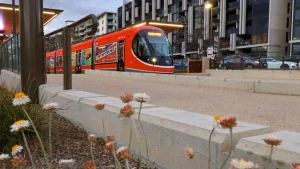UITP 2023 in beautiful Barcelona
Barcelona’s stunning architecture, culture, and cuisine provided the perfect setting for the UITP Global Public Transport Summit from 4 to 7 June 2023.
TTG’s experts joined public transport executives from around the world who gathered in the Catalan capital for the year’s most prestigious industry event.
The team relished connecting face-to-face with international peers, colleagues, and transport industry leaders. The global gathering was a tremendous success, enabling us to build upon our established partnerships and develop new relationships which will grow in the future.
Our stand was a vibrant hub of activity, hosting a series of networking events, presentations, demonstrations, panel discussions, and casual conversations, as we focused on demonstrating the value of TTG’s Driving Advice System (DAS) and Connected Driving Advice System (C-DAS) technology.
To benefit those who couldn’t attend the UITP Summit in person, we’ve shared some highlights that were particularly relevant to our partners and colleagues.
Contract management and PPP in the new economic environment
An issue that all UITP delegates had in common was how to successfully navigate the post-Covid economic climate, as increased inflationary pressures and the ongoing supply chain crisis contribute to global financial uncertainty.
This made the discussion on contract management and PPP in the new economic environment one of the conference’s most highly anticipated sessions.
The panel analysing the post-Covid landscape’s effect on public transport business models featured the World Bank’s Global Director for Transport, Nicolas Peltier-Thiberge, along with Transdev CEO Europe, Antoine Grange, and RATP Dev Executive Director of Customers and Engagement, Cecile Tuil.
Mr Peltier-Thiberge shared his insights into the sector’s ongoing global recovery from both Covid and the supply chain crisis, with ridership yet to regain former levels in many places and some evidence of a shift to non-motorised forms of transport. He explained that the World Bank has so far not seen a radical restructuring of existing contracts.
From Transdev’s perspective, Mr Grange suggested adapting existing contracts to suit the current inflationary environment. This included increasing the frequency of inflation reviews and the need for transport authorities and operators alike to ensure service viability by taking an adaptable approach.
Ms Tuil called for new business models which account for variations in fixed contractual risks, particularly relating to force majeure, indexation, exit clauses, governance, and payment schedules. She emphasised the need to take ridership out of the picture when contracting service delivery.
DAS presentation by Antony Chilton-Murphy
The second day featured a presentation by our Head of Operations, Antony Chilton-Murphy. This attracted an impressive group of senior executives to the stand.
Antony’s theme was that train operators and authorities should expect more from their fleets by leveraging the energy-saving benefits created by TTG’s DAS technology. He discussed the value of the ‘Golden Report’ which uses DAS data to give executives insights into where energy can be saved, as well as the monetary and carbon footprint savings achieved in the past month.
Antony also explained how DAS delivers additional benefits in right time running, improved customer experience, additional safety, and lower maintenance costs as well as highlighting the monetary impact of running trains on time.
He mentioned that UK trials with TTG’s partners, including Network Rail and Great Western Railway, have successfully demonstrated how C-DAS can add an enhanced level of connectivity to the core DAS platform.
The C-DAS technology constantly re-plans connected train movements across the network to minimise delays at an individual junction, or a network of junctions. It does this by resolving conflicts in real-time while also considering energy use, so opportunities for moving large amounts of traffic through the most complex locations can become much more sophisticated.
Antony concluded with a reference to SNCF in France which saves millions of euros in energy costs every month by using DAS on its TGV fleet.
Contact us
Did you make it to the UITP Summit? Let’s continue the conversation!
If you couldn’t attend, our team would be delighted to share their personal insights from Barcelona about the issues that were trending in presentations and on the conference floor.
We love to talk about technology solutions that reduce costs while improving safety and performance so get in touch with us today.



